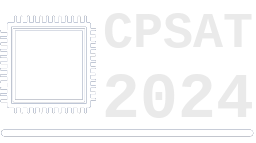
Prof. Muhammad Shafique, NYU Abu Dhabi, United Arab Emirates
(Title: A Cross-Layer Approach to Energy-Efficient and Secure EdgeAI: Architectures, Systems and Applications)
Abstract: Modern Machine Learning (ML) and Artificial Intelligence (AI) approaches, such as, the Deep Neural Networks (DNNs) and Large Language Models (LLMs), have shown tremendous improvement over the past years to achieve a significantly high accuracy for a certain set of tasks, like image classification, object detection, natural language processing, medical data analytics, and generative AI. However, these DNNs/LLMs require huge processing, memory, and energy costs, thereby posing gigantic challenges on building energy-efficient tinyML and EdgeAI solutions for a wide range of applications from Smart Cyber Physical Systems (CPS) and Internet of Thing (IoT) domains on resource/energy-constrained devices subjected to unpredictable and harsh scenarios. Moreover, in the era of growing cyber-security threats and nano-scale devices, the intelligent features of a smart CPS and IoT system face new type of attacks and reliability threats, requiring novel design principles for robust ML.
In my eBRAIN lab at New York University (AD, US), I have been extensively investigating the foundations for the next-generation energy efficient, dependable and secure AI/ML computing systems, while addressing the above-mentioned challenges across different layers of the hardware and software stacks. This talk will present design challenges, advanced techniques and cross-layer frameworks for building highly energy-efficient and robust cognitive systems for the tinyML and EdgeAI applications, which jointly leverage optimizations at different layers of the software and hardware stacks, and at different design stages (e.g., design-time vs. run-time approaches). These techniques provide crucial steps towards enabling the wide-scale deployment of energy-efficient and secure embedded AI in autonomous systems like UAVs, UGVs, autonomous vehicles, Robotics, IoT-Healthcare / Wearables, Industrial-IoT, smart transportation, smart homes and cities, etc. Towards the end, I will show some glimpses of our recent advanced projects on Quantum Machine Learning, Continual Learning, and Multimodal LLMs.

Dr. Farrokh Aminifar, University of Tehran, Iran
(Title: Evolution in Computing Paradigms for Internet of Things-Enabled Smart Grid Applications)
Abstract: The excessive number of connected devices and the unprecedented large volumes of data have triggered significant advancements in computing technologies to leverage the collected data for establishing novel services. Accordingly, cloud, edge, and fog notions have been developed to provide data processing, storage, and networking to fulfill the ever-changing application requirements. Recent efforts have attempted to push data processing closer to the edge of the network, where potential data producers and consumers reside. The evolving paradigm of computing methods has enabled innovative data-based solutions in health-care, industry, transportation, and energy domains for societal, economic, and productivity enhancements. Along with the computational shifts, power systems are undergoing transformative changes. Extensive penetration of non-dispatchable generation resources, electric vehicles (EVs), and storage systems is occurring at various levels of power systems, particularly at the edge of the grid. In response to such changes, distributed frameworks have been widely proposed to enable the management and alignment of consumer-owned energy resources to maintain the secure and reliable provision of electricity. The emerging computing paradigms have substantially contributed to a seamless interface between the conventional power systems and the future grid that is realized under the smart grid paradigm. In this talk, we discuss the chronological transformations in computing schemes and their contributions to power systems. Accordingly, the concepts of cloud, edge, and fog/edge are put forth. Moreover, quantum computing is discussed as a line of future research that can massively impact the energy sector, albeit in a different manner.

Dr. Mohammed Gharib, Clemson University, US
(Title: How to Secure Cooperative UAV Networks?)
Abstract: Ensuring security within wireless cooperative networks presents aformidable task, given the absence of infrastructure or centralized trustedauthorities. This challenge is further compounded in cooperative UnmannedAerial Vehicle (UAV) networks due to the dynamic nature of nodes inthree-dimensional space and the vulnerability to physical security threatssuch as drone hijacking. In this talk, I will propose a comprehensivearchitecture designed to address security concerns across cooperativenetworks, with a particular focus on UAV networks. By delving into specificdetails, I aim to provide insights into mitigating security concerns anddeveloping the required security services.
